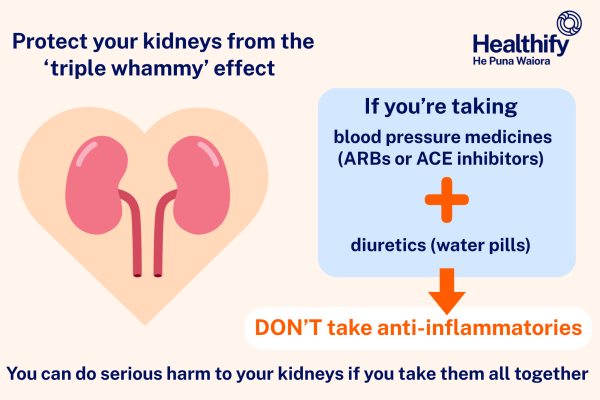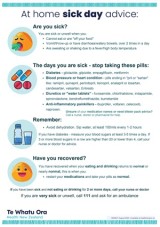Diuretics
Also called 'water pills' or 'water tablets'
Key points about diuretics
- Diuretics are medicines that help your body get rid of extra salt (sodium) and water.
- They work by increasing the amount of urine (pee) you make.
- Diuretics are also called ‘water tablets’ or ‘water pills’.

Diuretics help your body get rid of extra salt (sodium) and water. They work by increasing the amount of urine (pee) you make.
Getting rid of extra water decreases the strain on your heart and blood vessels, by lowering blood pressure. This effect can also improve symptoms such as trouble breathing and swelling (oedema). This is why diuretics are also called ‘water tablets’ or 'water pills'.
Diuretics are used to treat conditions such as high blood pressure (hypertension) and swelling (oedema) in your feet, ankles and stomach caused by heart failure, kidney failure or liver failure.
The main classes or types of diuretics include loop diuretics, thiazide diuretics and potassium-sparing diuretics.
Each type affects a different part of your kidneys and may have different uses.
- Examples of loop diuretics are furosemide and bumetanide.
- Examples of thiazide diuretics are bendroflumethiazide, chlortalidone, indapamide, metolazone, and hydrochlorothiazide, which is only available in combination with other medicines, such as hydrochlorothiazide plus losartan (Arrow-Losartan & Hydrochlorothiazide®) and hydrochlorothiazide plus amiloride (Moduretic®).
- Examples of potassium-sparing diuretics are amiloride, spironolactone and eplerenone.
Your healthcare provider will discuss which diuretic is best for you – this usually depends on your health and the condition being treated.
Time your doses
When you first start taking diuretics, you will pee (urinate) more often and in larger amounts. This will decrease after you've taken the medication for a while.
Because diuretics cause you to pee more often, most people prefer to take it in the morning. You may need a second dose at lunchtime.
- You will get to know how long it takes for your diuretic tablet to work after you've started taking it, then you can plan your day around it.
- If you want to go out in the morning and don't want to have to find a toilet, you can delay taking your dose until lunchtime or early afternoon.
- Avoid taking your dose within 6 hours of your bedtime to prevent having to get up often to have a pee during the night.
Taking diuretics with pain medicines
Be careful when taking some pain relief medicines. Taking NSAIDs, such as ibuprofen and diclofenac, together with blood pressure medicines, can be harmful to your kidneys. This is called the ‘triple whammy’. NSAIDs can also be found in some cold and flu medicines.
If you're taking diuretics with other blood pressure medicines, such as ACE inhibitors or ARBs, tell your healthcare provider or pharmacist before starting NSAIDs. Talk to them about safe pain-relief options for you.

Image credit: Healthify He Puna Waiora
Read more about:
Some other things to know when you're taking diuretics
- Have a sick day plan: If you have diarrhoea (runny poo) or vomiting (being sick) from a stomach bug, or you're dehydrated from another illness, it’s important to let your healthcare provider know. They may advise you to stop taking your diuretic for a few days and start again when your eating and drinking returns to normal.
- Alcohol: Diuretics don't directly interact with alcohol. This means that most people could have the occasional drink while taking their diuretic without any serious problems. However, if your diuretic makes you feel dizzy or sick (nausea), don't drink alcohol as it will make you feel worse.
- Monitoring: You may need regular blood and urine tests to check potassium, sodium and blood glucose levels. This is to make sure that all the chemicals in your bloodstream are properly balanced.
- Weighing yourself: If you are taking your diuretic for heart failure, the best way to know if it is working is to weigh yourself at the same time each day.
- Interactions: Diuretics may interact with other medicines, herbal supplements and rongoā Māori, so check with your healthcare provider or pharmacist before starting your diuretic and before starting any new products.
- Pregnancy or breastfeeding: Talk to your healthcare provider if you're pregnant, planning a pregnancy or want to breastfeed.
Like all medicines diuretics can cause side effects, although not everyone gets them. If you're concerned about any symptoms you think might be related to your medicine, talk to your healthcare provider. The information below offers some guidance but doesn’t include all possible side effects.
Common side effects
Tell your healthcare provider if these side effects bother you.
- Needing to pee more often: It's a good idea to know where the nearest toilets are when you’re away from home.
- Nausea (feeling sick) or having a sore stomach: Take your tablets with or just after food.
- Feeling light-headed or dizzy: Don’t drink alcohol. Be careful when driving or using tools until you know how this medicine affects you.
- Feeling faint when you stand up: Be careful when getting up from either lying down or sitting to avoid falls. These effects put you at risk of falls and injuries, especially if you're an older adult.
Tell your healthcare provider immediately or phone Healthline free on 0800 611 116 if these occur
- Signs of dehydration (losing too much salt and water) such as muscle cramps, weakness, dry mouth, feeling thirsty all the time or passing less urine than usual.
Phone 111 for an ambulance or go to your nearest accident and emergency (A&E) clinic if these occur
- Signs of an allergic reaction such as itchy skin, and rash, swollen lips or tongue, problems breathing, like a tight chest or shortness of breath.
Read more about medicines and side effects and reporting a reaction you think might be a side effect.
The following links have more information on diuretics. Be aware that websites from other countries may contain information that differs from New Zealand recommendations.
Loop diuretics(external link) Patient Info, UK
Thiazide diuretics(external link) Patient Info, UK
Potassium-sparing diuretics(external link) Patient Info, UK
Brochures
At home sick day advice(external link) Health New Zealand | Te Whatu Ora, 2023
Medicines and side effects(external link) Healthify He Puna Waiora, NZ, 2024
5 questions to ask about your medications (external link)Health Quality and Safety Commission, NZ, 2019 English(external link), te reo Māori(external link)
References
- Diuretics(external link) New Zealand Formulary
- Avoiding the triple whammy in primary care – ACE inhibitor/ARB + diuretic + NSAID(external link) BPAC, NZ, 2018
- Addressing heart failure in primary care: Part 2 – initiating and optimising treatment for heart failure(external link) BPAC, NZ, 2025
- Hypertension in adults – the silent killer(external link) BPAC, NZ, 2023
Brochures

At home sick day advice
Health New Zealand | Te Whatu Ora, 2023

Medicines and side effects
Healthify He Puna Waiora, NZ, 2024

Health Quality and Safety Commission, NZ, 2019 English, te reo Māori
Credits: Healthify editorial team. Healthify is brought to you by Health Navigator Charitable Trust.
Reviewed by: Stephanie Yee, Pharmacist, Auckland.
Last reviewed:





